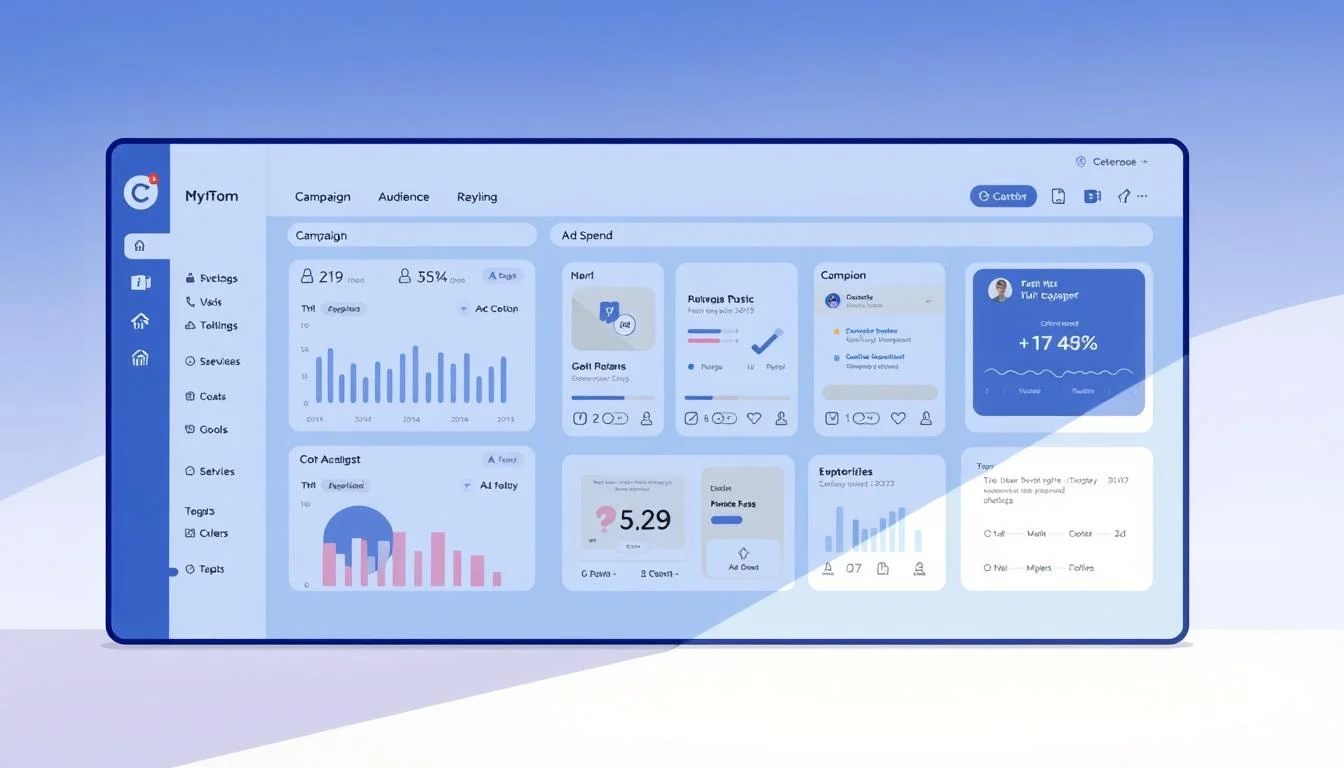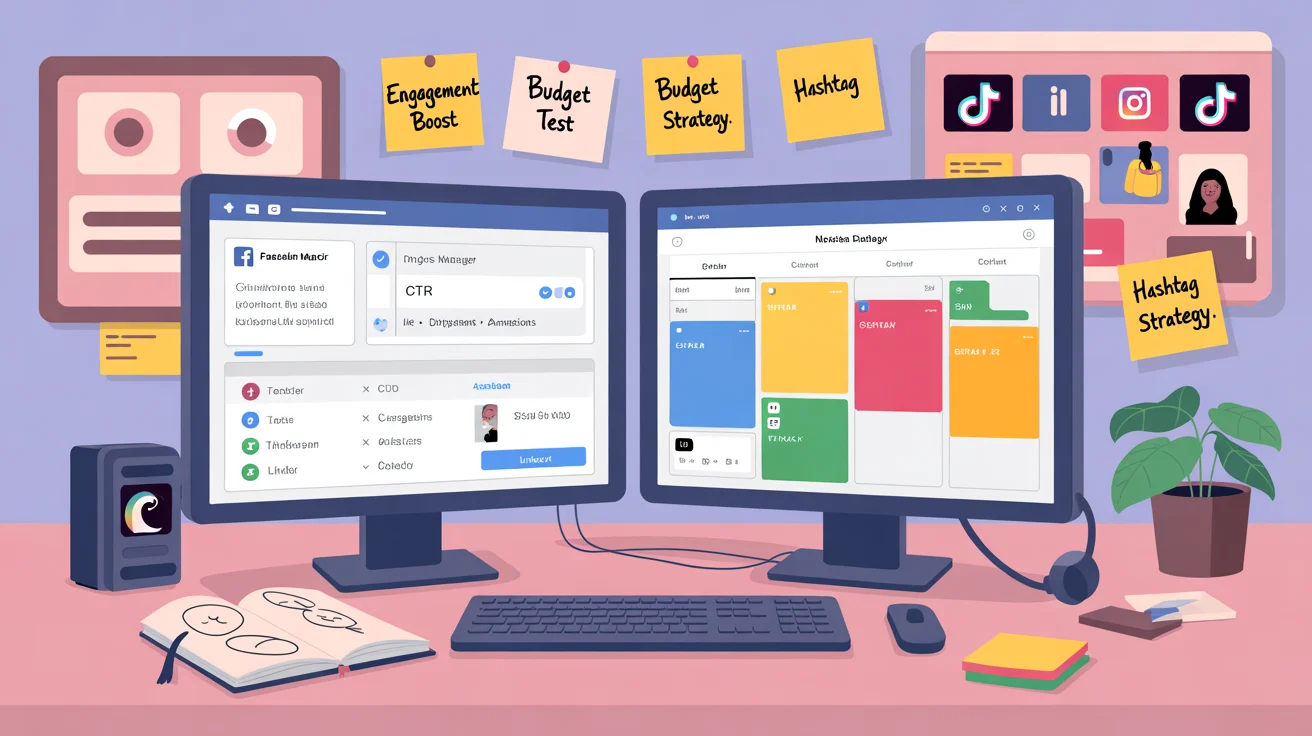Are you finding it hard to make money from your social media? With 3.5 billion people checking their feeds every day, the chance to succeed is huge. But, 90% of brands are all vying for the same attention.
Finding the right social media campaign managers and ad experts can be tough. Your business’s success depends on making the right choices. The fight for people’s attention is intense, and generic strategies just don’t work anymore.
I’m here to help you navigate this challenge. Whether you run a small business or a growing company, experts in paid social media marketing can change your online game. Find experienced freelancers who can show you real results for your ad budget.

In this detailed guide, I’ll show you how to find, hire, and work with top campaign managers who know social media ads inside out.
Table of Contents
Key Takeaways
- Over 3.5 billion people use social platforms daily, creating massive marketing opportunities
- 90% of brands compete for attention, making expert guidance essential for success
- Professional managers deliver measurable ROI through strategic advertising approaches
- Hiring specialists saves time while maximizing your advertising budget efficiency
- Experienced freelancers understand platform algorithms and targeting techniques
- Strategic partnerships with marketing agencies provide scalable growth solutions
Understanding Your Social Media Marketing Needs
Starting a paid social media campaign needs a solid base. You must know your business goals and needs first. Many companies rush into hiring without this step. This leads to goals not being met and disappointing results.
Social media ads can target very precisely. With over 3.5 billion users, you can reach a huge audience. But, you need to know what you want to achieve to make the most of it.
Defining Your Campaign Goals
Your campaign goals should be more than just selling more. Think about boosting brand awareness, getting quality leads, or increasing website visits. Each goal needs its own campaign strategies and ways to measure success.
Having clear marketing objectives helps your campaign manager focus. It also sets up ways to measure success that you and your manager can follow during the campaign.
Identifying Your Target Audience
Knowing your target audience is more than just demographics. You need to understand their behaviors, likes, and how they use social media. This detailed view lets you use social media’s precise targeting well.
Setting Your Ad Budget Parameters
Your ad budget sets how big your campaign can be and how much you can test. Start with a budget that lets for optimization and scaling. This way, your manager can do meaningful tests and make improvements.
| Budget Range | Campaign Scope | Testing Capacity | Optimization Level |
|---|---|---|---|
| $500-$1,500 | Single platform focus | Basic A/B testing | Limited optimization |
| $1,500-$5,000 | Multi-platform reach | Advanced testing | Regular optimization |
| $5,000-$15,000 | Comprehensive campaigns | Extensive testing | Continuous optimization |
| $15,000+ | Enterprise-level reach | Full testing suite | Real-time optimization |
What Makes Effective Social Media Campaign Managers and Ad Experts
Finding the right social ad experts is key. They need technical skills, creative thinking, and analytical know-how. This mix drives real success in campaigns.
Top managers know a lot about how social media platforms work. They can adjust strategies for each platform.

Essential Skills and Qualifications
Great campaign managers have experience in paid ads across many channels. They know how to use analytics tools well. They also know how to read performance metrics.
They must be good at managing projects. They handle many campaigns, meet deadlines, and talk to clients. They also need to write well for ads and reports.
The best ones keep up with digital marketing trends. They always learn new things to stay sharp.
Platform-Specific Expertise Requirements
Each social media platform has its own rules and best practices. Good managers know these differences. They understand Facebook’s auction system, Instagram’s visual approach, and LinkedIn’s professional targeting.
They have hands-on experience with tools like Facebook Ads Manager and Twitter Ads. Knowing advanced features like custom audiences is important.
Managing campaigns is more than just running ads. They know about creative specs, audience behavior, and the best times to post.
Data-Driven Decision Making Capabilities
Top managers use analytics to improve campaigns. They turn complex metrics into clear insights and reports.
They use data to test ads, adjust targeting, and manage budgets. They know which metrics are important for different goals. They can explain trends in simple terms.
| Skill Category | Key Requirements | Experience Level | Impact on Results |
|---|---|---|---|
| Technical Expertise | Platform navigation, tool proficiency | 2+ years hands-on | High efficiency |
| Analytics Knowledge | Data interpretation, reporting | Advanced level | Better optimization |
| Creative Skills | Ad copy, visual concepts | Intermediate to advanced | Higher engagement |
| Strategic Thinking | Campaign planning, audience targeting | Senior level | Improved ROI |
The best managers can solve problems quickly. They adapt when campaigns don’t do well. They keep track of what works and what doesn’t. This helps improve future campaigns.
Step 1: Preparing Your Campaign Brief
Before you start looking for the right campaign manager, getting ready is key. A detailed campaign brief is the base for a good social media marketing partnership. I always say this document is critical for a successful team-up.
Think of your brief as a guide. It helps managers understand your vision. The more detailed and organized it is, the better your marketing campaign will do.

Documenting Your Business Goals
Begin by clearly stating your business goals. Are you aiming to make more money, enter new markets, or boost brand awareness? List specific results you want to see.
Your goals should tie directly to your products or services. For instance, if you’re introducing a new product, your goal might be to spark interest and drive early sales.
Outlining Campaign Objectives
Turn your business goals into specific campaign objectives. Instead of saying “increase sales,” say “boost online conversions by 25% in three months.” This makes it easier for managers to create focused strategies.
Include when you expect results and what success looks like. These details keep everyone on the same page during the campaign.
Gathering Brand Assets and Guidelines
Put together all your brand and marketing stuff in one place. Include your logo in different sizes and formats, brand colors with hex codes, and font guidelines.
Most importantly, share your brand’s voice and how you want to be seen. Give examples of content you like and messages that connect with your audience.
Step 2: Researching top talent
Your search for top talent starts with knowing where to look and what to check. Begin by using a mix of job boards and specialized sites. This helps you find a wide range of qualified candidates.
Where to Find Top Talent
Post job ads on sites like indeed, ZipRecruiter, LinkedIn Jobs, and Monster. These sites attract many candidates.
For targeted results, check out marketing-focused boards. Job Board Fire and Acadium are great for finding marketing pros who know social media.
LinkedIn and Fiverr are also good places to find experienced managers. Looking for a reliable platform to find freelance campaign managers? Check out trusted freelancing sites that connect businesses with skilled social media pros.
Evaluating Portfolio and Case Studies
Look for specific, measurable results, not just claims. Ask for campaign data like cost per acquisition and return on ad spend. These numbers show how well they’ve done.
Make sure their past work fits your industry. The right campaign manager will have experience with similar businesses and audiences.
Checking Client Reviews and Testimonials
Client feedback shows how a manager works in real life. Look for reviews that talk about their communication, meeting deadlines, and results.
Good testimonials highlight a manager’s skill in growing businesses with paid social media. The best fit will have positive feedback from many projects.
Step 3: Screening and Interviewing Candidates
Finding the right paid social campaign manager is a big task. It needs a smart way to screen and interview candidates. I start with disqualifying questions to save time and find the best people.
Ask direct questions like “Do you have at least two years of experience managing Facebook ads for e-commerce companies?” This helps weed out those who don’t fit your needs.

Key Questions to Ask
In my interviews, I look for real expertise. Ask candidates to explain setting up a Facebook ads campaign for your industry. Also, ask about their experience with targeting and budgeting.
Present a scenario where an Instagram ads campaign fails. The best candidates will talk about A/B testing, audience analysis, and creative tweaks. This shows their problem-solving skills.
Assessing Technical Knowledge
Technical skills are key for a good Facebook ads manager. I ask about their optimization process and tool knowledge.
Ask for examples of improving campaign results. Discuss their experience with ad formats and managing ads for different goals.
Evaluating Communication Skills
Communication skills are vital for working closely with your manager. Listen to how they explain complex social media concepts.
See how they respond to your questions and if they ask smart questions about your goals. I suggest getting references and doing a small test project before deciding.
Step 4: Comparing Pricing and Service Packages
The cost of social media advertising management varies a lot. It’s key to compare prices and what you get carefully. I’ve seen many businesses jump into deals without knowing the real cost. This step can save you a lot of money and avoid future problems.
Paid social ads work on a bidding system. You only pay when someone clicks your ads. This keeps costs down, but management fees add more to think about.

Understanding Different Pricing Models
There are three main pricing types in the market. Flat monthly retainers have set costs but don’t grow with your success. Percentage-based pricing matches your ad spending but gets pricey as budgets increase.
Performance-based pricing seems good but can lead to short-term thinking. Each pricing model changes how managers handle your ads.
Evaluating Service Inclusions
Knowing what’s included prevents surprises later. Some managers cover setup, creative work, and ongoing tweaks in their fee. Others charge extra for each service.
I suggest managers who make you pay platforms directly, not including ad budget in their fee. This makes your ad spending clear.
Calculating Return on Investment
Good ROI calculations look at management fees and total ad budget. A manager who brings in 4:1 returns at a higher fee is better than a cheap option that barely breaks even.
Look at campaign performance chances, not just initial costs. The cheapest option usually doesn’t give the best ROI for your ads.
| Pricing Model | Best For | Typical Range | Pros | Cons |
|---|---|---|---|---|
| Flat Retainer | Small budgets | $1,000-$5,000/month | Predictable costs | Doesn’t scale |
| Percentage of Spend | Growing businesses | 10-20% of ad spend | Aligned incentives | Expensive at scale |
| Performance-Based | Established brands | 15-30% of results | Pay for results | Short-term focus |
| Hybrid Model | Enterprise clients | Base + performance | Balanced approach | Complex structure |
Step 5: Making Your Final Selection
Choosing the right campaign manager is key. It’s about finding someone with the right skills, at a good price, who fits your company’s culture. The best social media experts aren’t always the most expensive.
Look for someone whose skills match your needs. Think about how much time you can spend guiding them each day.

Weighing Experience vs. Cost
Consider how much time you have to oversee daily. If you’re short on time, choose an experienced manager. They should be able to work well on their own with good advertising strategies.
But if you have a lot of time to guide, a junior manager might be better. They can learn and grow with your business, helping with solid marketing solutions.
Ensuring Cultural Fit
Your campaign manager is your brand’s voice online. They need to understand your company’s culture and values. Look for someone who shows real interest in your industry.
See if they get your brand’s personality. The best marketing approach comes from someone who shares your mission and connects with your audience.
Verifying Availability and Timeline
Top managers are often in demand. Make sure they’re available and can commit to your project. A dedicated account manager who can give your campaign execution the time it needs is vital.
Check if they can meet your deadlines and reporting needs before you decide.
Setting Up Your Working Relationship
Starting a strong partnership with your dedicated account manager begins with good onboarding and communication. This base is key for a smooth campaign management from the start.

Introduce your new team member to your brand guide in the first week. Show them your social media and management tools. Explain the goals you want them to achieve first.
Establishing Clear Communication Channels
Pick communication methods that fit both of you. Use Slack for quick updates, video calls for strategy, and email for reports. This avoids confusion.
Ensure your business manager knows how to contact you for urgent vs. routine matters. This keeps your marketing communications running smoothly.
Defining Roles and Responsibilities
Be clear about what your campaign manager does and what you handle. Make a list of:
- Campaign creation and audience research
- Ad copywriting and budget management
- Creative asset approval processes
- Budget increase authorizations
This avoids confusion and keeps your media management organized.
Creating Reporting and Review Schedules
Set up a regular schedule for your marketing initiatives. Weekly updates keep campaigns on track. Bi-weekly reviews dive deeper into strategies.
Monthly reports should include insights and plans for the next month. This keeps strategy sharp while allowing for quick changes when needed.
💡 Want Clicks That Convert? This Freelance Campaign Manager Knows the Secret Formula
Managing Your Paid Social Media Campaigns
Managing ads on social media means always watching, testing, and tweaking to get measurable results. I team up with campaign managers to make sure your social media ads run well from start to finish.
This job needs a careful plan that mixes big-picture thinking with small details. Your manager should keep you updated and talk openly about the campaign’s progress.

Launch Phase and Active Monitoring
At the start, I make sure tracking systems are ready before ads are live. Your manager checks if the right people are seeing your ads and if the ads match your goals.
The first week is all about daily checks to spot problems fast. Making quick changes to who sees your ads, how much you spend, or what your ads say can save money and boost results right away.
Analytics and Performance Assessment
Tracking how well your campaign does is key to success. I look for detailed reports on things like how much each click costs, how many people take action, and how much money you make back from ads.
Your manager should do campaign audits often to find ways to get better. The best ones explain their findings and why it helps plan for the future.
Continuous Optimization Techniques
Good managers keep improving by trying new things. They test different groups of people, tweak ad messages, and adjust how much they pay for ads based on how well they do.
This means trying out different versions of ads to see what works best with your targeted social media audience. Making smart choices about where to spend your budget helps get the best results.
Measuring Campaign Effectiveness and ROI
Effective campaign managers focus on measurable results that grow your business. They look beyond likes and shares. Your investment should see clear, real business value.
“The best social media marketing ads managers analyze the success of ads to determine what’s going right and wrong, and they report results with transparency.”
Essential Metrics That Drive Results
I track key indicators that impact your bottom line. Metrics like cost per acquisition and return on ad spend are important. Your marketing should show measurable ROI through customer value and tracking.
These metrics show which campaigns grow your business. I focus on data that boosts revenue.
Understanding Your Performance Data
Looking at performance requires more than just snapshot metrics. I study patterns over time and across different audiences. This helps me see what works and what needs improvement.
Your manager should explain why some campaigns do better. Analytics give insights for better strategies.
Implementing Smart Optimization Strategies
Data-driven tweaks make campaigns successful. I adjust budgets to focus on top ads and refine targeting based on data. This approach optimizes performance.
Good managers spot chances to grow and suggest changes when needed. They aim to understand all social media ads fully.
📊 From Zero Sales to Fully Booked — Thanks to a Freelance Ads Manager
Common Challenges and How to Overcome Them
Managing paid social media campaigns comes with challenges. Even skilled managers face obstacles in the campaign lifecycle. They need to think ahead and adapt quickly.
Ignoring these challenges can ruin promising campaigns. It’s important to spot them early and have solutions ready.
Budget Management Issues
Budget problems are a big challenge in social advertising. When campaigns do well, it’s tempting to spend more. But this can mess up how ads learn.
Managers should increase budgets slowly, by 20-30% at a time. They should also set up budget controls and alerts. This helps avoid overspending on different platforms like Google Ads when using integrated strategies.
Creative Fatigue and Ad Copy Problems
Creative fatigue is a big issue in advertising and marketing. Ads and visuals lose their impact as people see them more.
Managers should test new ad copy and visuals regularly. They should change them every 2-3 weeks. A full-funnel marketing approach helps by using different messages for different stages of the customer journey.
Platform Algorithm Changes
Algorithm updates can change how well campaigns perform overnight. It’s key for managers to keep up with these changes.
When Facebook or Instagram’s algorithms change, managers need to adjust quickly. They should change targeting and bidding strategies. The best managers see these changes as chances to outdo their competitors.
“The best campaign managers don’t panic when algorithms change – they see these shifts as opportunities to outmaneuver the competition.”
Scaling Your Social Media Marketing Efforts
Expanding your marketing efforts across platforms needs careful planning. It’s about using what works and finding new ways to grow. Each platform has its own best practices for success.
Scaling up is more than just spending more money. It’s about making smart choices on where to put your resources for the best results.
Expanding to New Platforms
When expanding media presence, we first look at where your audience is online. Each platform has its own way of working. Your manager should tailor strategies for each one, not just copy from one to another.
The goal is to increase brand awareness and drive traffic to your website on many platforms. This keeps your message consistent while fitting each platform’s needs.
Increasing Ad Spend Strategically
Increasing your budget needs careful thought about how well your ads are doing and the market. I suggest growing successful campaigns slowly while trying new things. Your social media management team should use marketing automation to make the most of your budget.
This way, you get the most out of your money as you spend more on your running social campaigns.
Building Long-term Partnerships
Working with experienced managers can lead to lasting partnerships. They help make big decisions and suggest new tools. The best strategies mix what works with new ideas to stay ahead in the game.
| Platform | Audience Type | Primary Ad Format | Scaling Strategy |
|---|---|---|---|
| Broad Demographics | Image/Video Ads | Lookalike Audiences | |
| Younger Users | Stories/Reels | Influencer Partnerships | |
| Professionals | Sponsored Content | Industry Targeting | |
| TikTok | Gen Z/Millennials | Short Videos | Trend Participation |
Transform Your Business with Professional Social Media Marketing
Finding the right paid media professionals can change your business for the better. I’ve shown you how to hire top campaign managers who get your business. They know how to make your social media marketing a success.
Investing in professional advertising services is worth it. Skilled managers bring strategies that help your business grow. Your social media ads will do much better with their help.
Start looking for the right manager today. Look for those with success stories like yours. Check their work and ask important questions. The right manager can help your business grow with paid media.
Now, it’s time to start contacting possible candidates. Use this guide to find advertising pros who will help your business grow. The right team will make your online presence a key to making money.
🗝️ Unlock the Secret to Profitable Ads — Hire Freelance Campaign Manager Today
FAQ
How much should I budget for hiring a paid social media campaign manager?
The cost of a campaign manager varies based on their experience and what they offer. You might pay a flat fee of $2,000 to $10,000+ each month. Or, it could be a percentage of your ad spend, like 10-20%. Don’t forget to budget for your ad spend too. Start with at least $3,000 to $5,000 a month. This lets you test and improve your ads on different platforms.
What’s the difference between a social media manager and a campaign manager?
A social media manager handles organic content and community management. They focus on your overall social media presence. A campaign manager, on the other hand, specializes in paid social media ads. They optimize your ad spend and analyze performance to drive ROI through targeted ads.
How long does it take to see results from paid social media campaigns?
You’ll see initial data in 7-14 days. But, meaningful results take 30-60 days. This allows for audience testing and creative optimization. Your manager should give you weekly updates in the first month. After a month, you’ll see significant optimization opportunities.
Which social media platforms should I prioritize for paid advertising?
Choose platforms based on your target audience and goals. Facebook and Instagram are great for most businesses due to their targeting options. LinkedIn is best for B2B companies. TikTok is good for younger audiences. Twitter is great for real-time engagement. Your manager will help pick the best platforms for you.
What metrics should I track to measure campaign effectiveness?
Focus on metrics that impact your business goals. I prioritize cost per acquisition, return on ad spend, and conversion rates. Your manager should report on these key metrics. They’ll also share platform-specific metrics to help improve your ads.
How often should I communicate with my campaign manager?
Set up clear communication from the start. Daily check-ins for the first week are good, then weekly reviews and monthly discussions. Your manager should be available for urgent issues. They should also keep you updated on campaign performance and optimization.
What happens if my social media campaigns aren’t performing well?
Poor campaign performance is a chance to improve. A good manager will analyze data, test new audiences, and refresh ads. They’ll adjust targeting and use A/B testing to boost performance. They’ll also consider competitor strategies and make data-driven changes.
Do I need to provide creative assets, or will the campaign manager create them?
It depends on the manager and service package. Some include creative development, while others focus on management and optimization. Make sure you have brand guidelines and approved imagery ready. Even if your manager creates ads, you’ll need to approve them before launch.
How do I know if my campaign manager is delivering good results?
Good managers provide clear, transparent reporting. They should show improving metrics and offer insights into audience behavior. They should also make proactive recommendations for scaling successful campaigns. Look for managers who explain their strategies and show measurable improvements.
Can I work with a campaign manager if I have a small budget?
Yes, you can! Many experienced managers work with businesses of all sizes. Be open about your budget and look for managers who specialize in small business marketing. Even with a small budget, a skilled manager can help you get the most ROI. They’ll use precise targeting and effective ad copy to make the most of your budget.
What should I do if I need to scale my social media advertising efforts?
Scaling requires a strategic approach. Work with your manager to expand successful campaigns and test new audiences. Consider adding more platforms or advanced marketing tools to support your growth. This will help you reach more people and achieve your goals.
How do I handle campaign management across multiple social media platforms?
Managing multiple platforms requires expertise in each platform’s unique features. Look for managers with experience on your target platforms. Or, consider a team with platform specialists. Your manager should develop strategies for each platform while keeping your brand consistent across all ads.
Related Articles:
This post contains affiliate links, which means I may earn a commission if you make a purchase through these links. There is no additional charge to you! Thank you for supporting my blog so I can continue creating free content each week!





